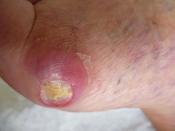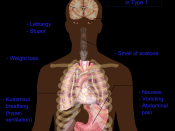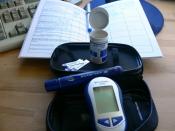Diabetes Mellitus is a major health problem of today. Approximately one hundred and thirty five million people have been diagnosed worldwide and will rise to around three hundred million in the next seven years (PubMed 2000). Treatment involves a well-balanced proper diet, exercise and medication to control blood sugar and prevent symptoms and problems. Over time, it may be more difficult to keep your blood glucose levels in your target range. Fortunately, good diabetes care and management while incorporating your food plan, activity and medications into your daily life can prevent or delay the onset of major health complications (ndep.nih.gov 2011).
The most important and beginning treatment for type 2 diabetes is nutrition and following a healthy diet and an exercise program. Maintaining a healthy diet is especially important for people with diabetes and following the right meal plan can make all the difference to a person struggling to keep their blood sugar under control.
You should eat healthy food such as fruits and vegetables, fish, lean meats and whole grains. Also eat foods that have less fat and salt and more fiber (NIDDK 2011).
Carbohydrates, for example, have the most immediate effect on your blood sugar since they are broken down directly into sugar early during digestion and therefore should be monitored (NEW ENGL J MEDO 2011). Being overweight and obesity are significantly associated with diabetes. Compared with adults with normal weight, adults with a BMI of 40 or higher has higher odds for diagnosed diabetes (JAMA 2003). Obesity can cause many symptoms and complications to worsen and progress. Physical activity is a crucial aspect that could help manage and prevent symptoms and sometimes delay the onset of the severity of the disease. The article, "Effects of Aerobic Training, Resistance Training, or Both on Glycemic Control in Type 2...


